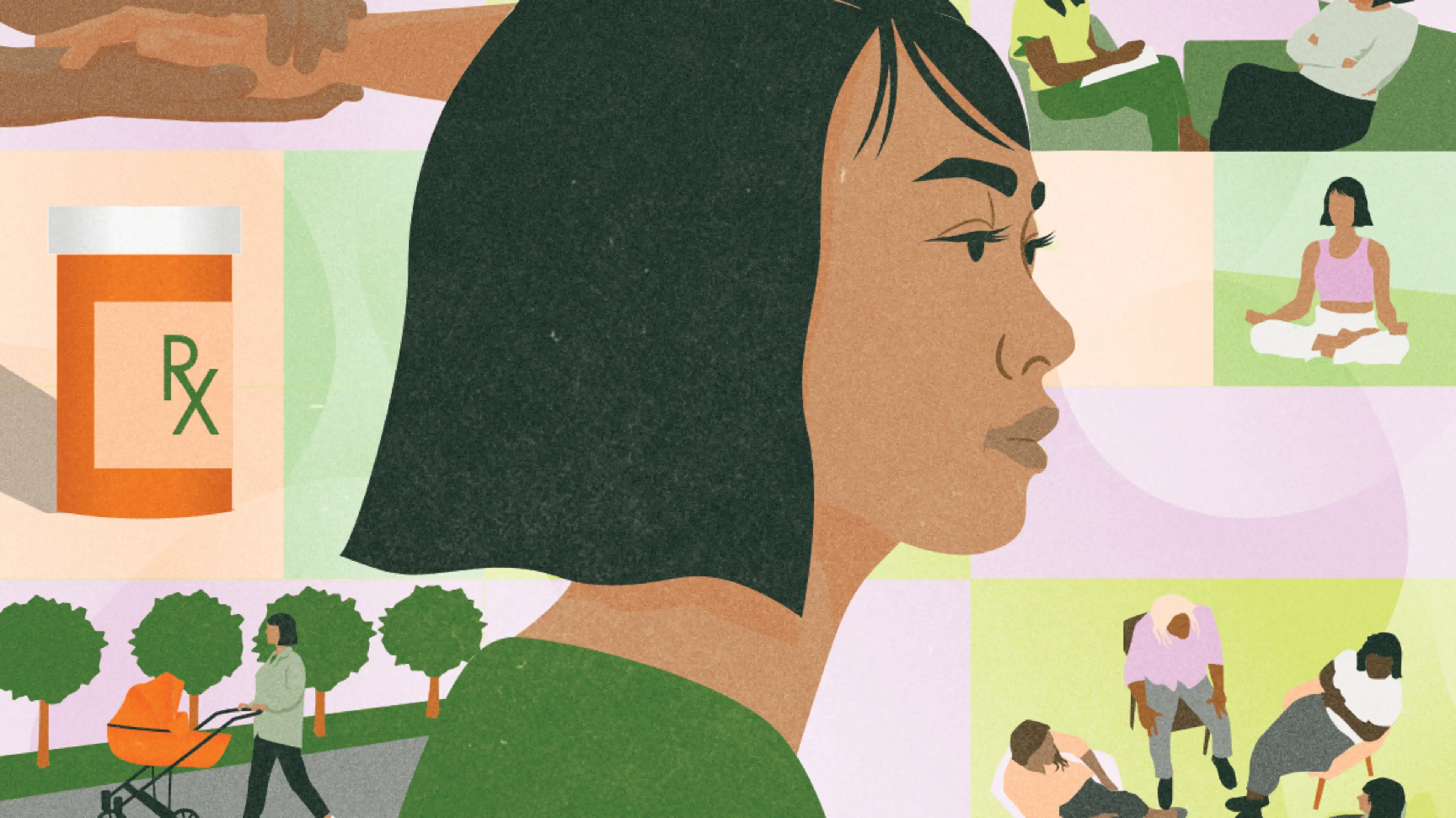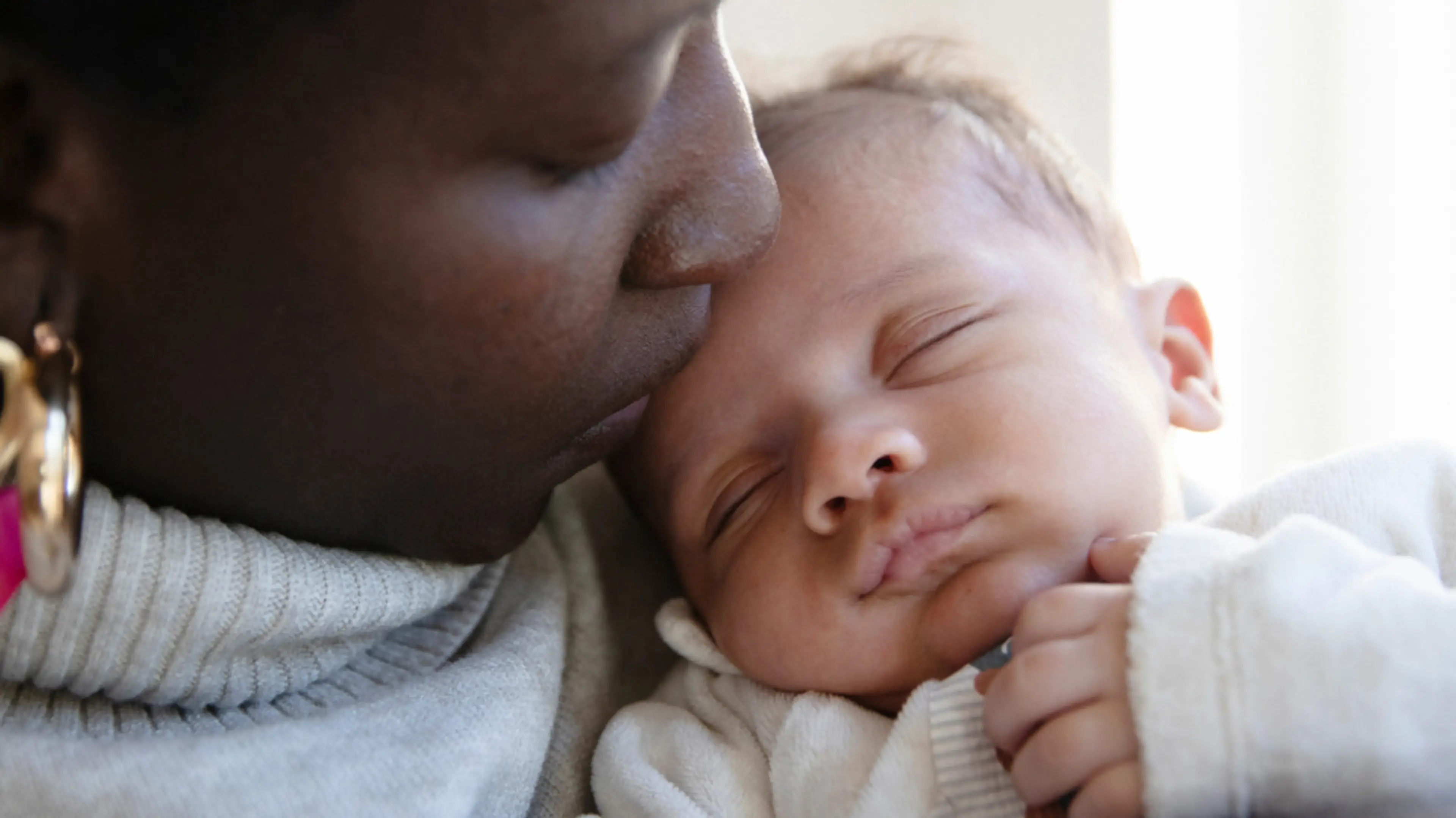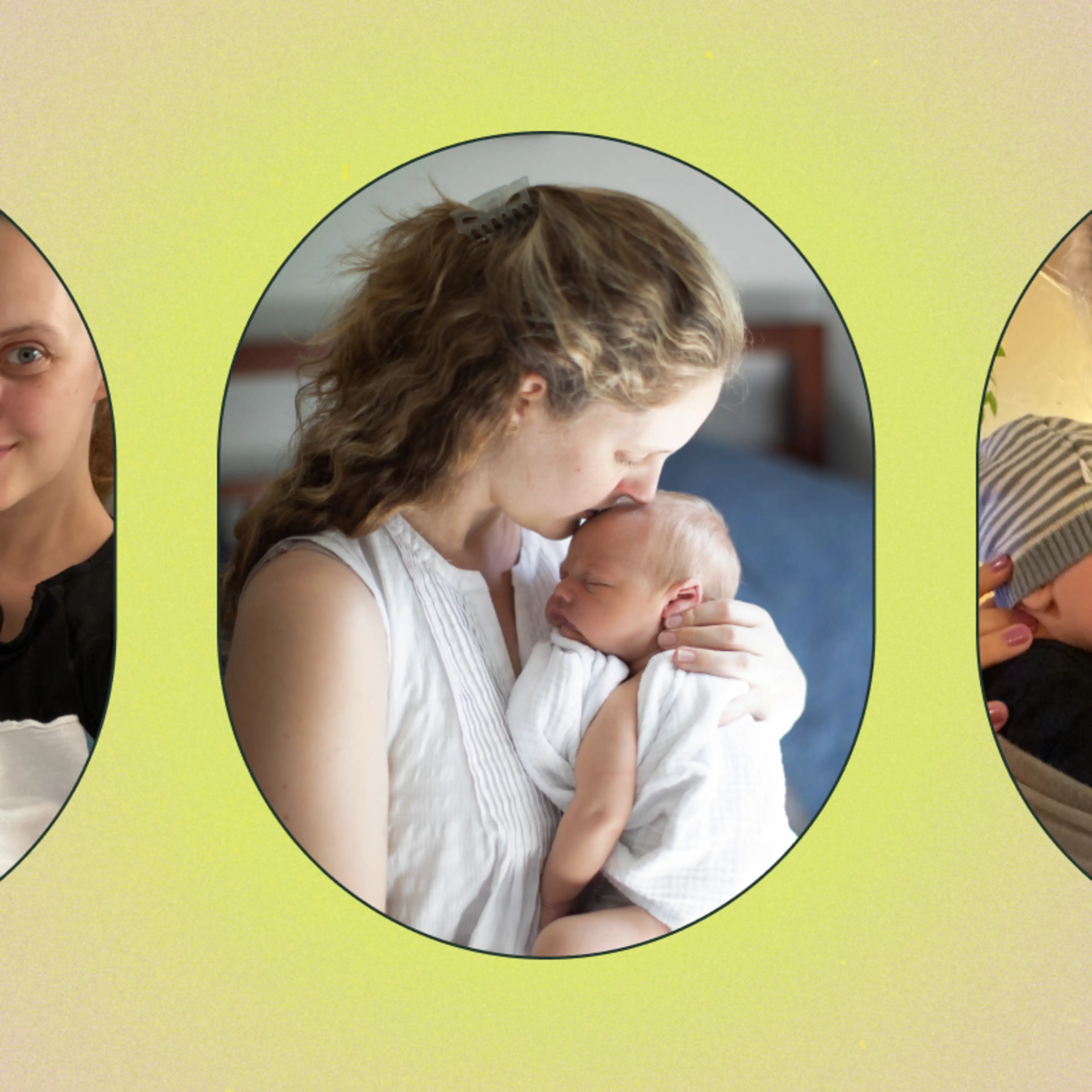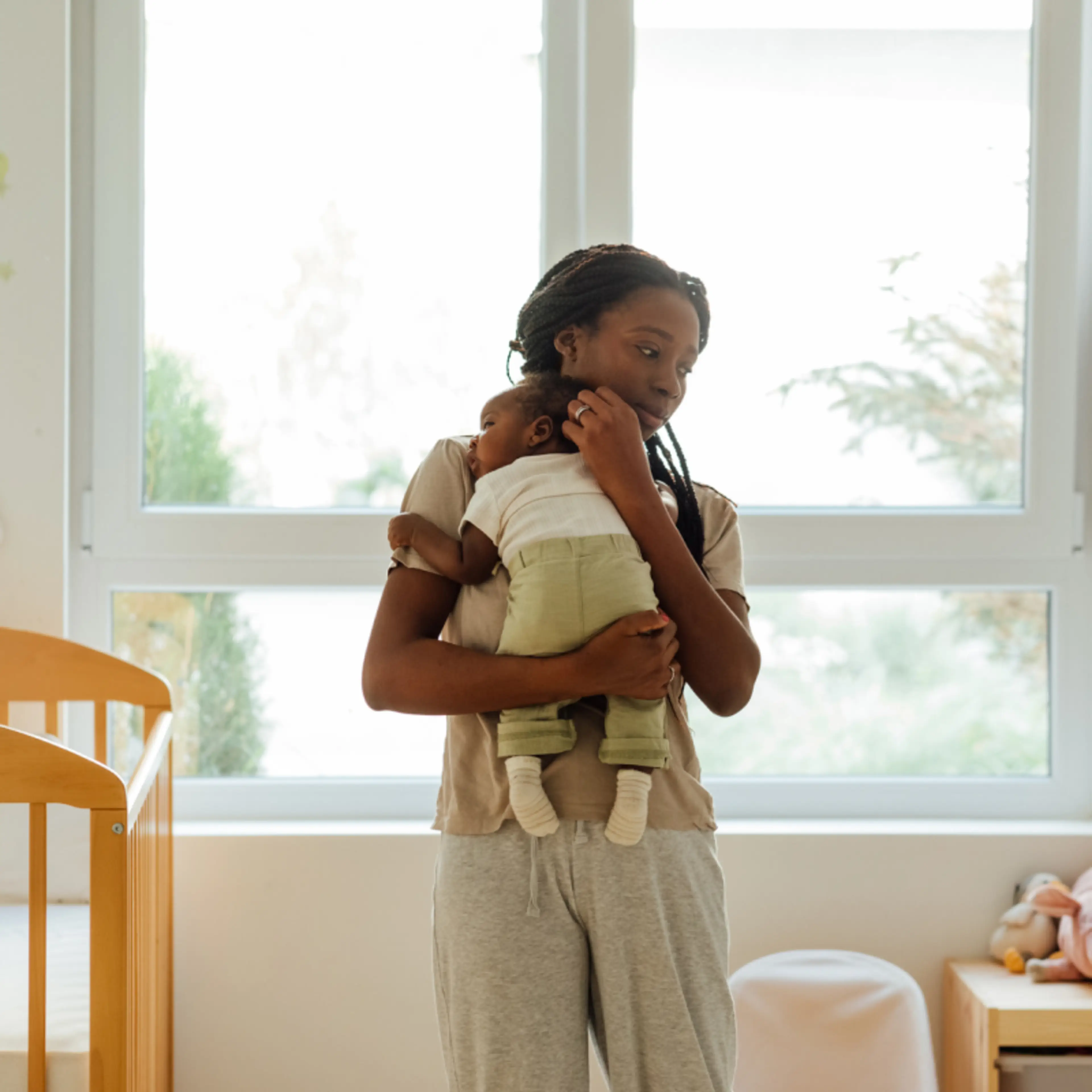There's no question, having a baby can be hard. Yes, there are bursts of joy and a newfound love that runs so deep it makes your bones ache. But two things can be true at once: you love your baby, and the sheer physicality of giving birth, plus the emotional upheaval of figuring out how to take care of this tiny human in the strange new world of motherhood, is a lot.
So, it’s no surprise that about 20 percent of new moms experience postpartum depression, a figure that rose from 9.4 percent in 2010 to 19.3 percent in 2021, with the largest increases seen in Black, Hispanic, and Asian/Pacific Islander mothers, according to a 2022 study1 .
Thankfully, awareness around perinatal mood disorders is getting better—this encompasses everything from perinatal depression to postpartum depression (PPD), postpartum anxiety (PPA), and obsessive-compulsive disorder. But when you’re in the thick of the newborn haze, it can be really hard to recognize that you’re not doing well. (If you are questioning whether what you’re feeling is normal, it’s a good idea to reach out for help either through your healthcare provider or an online resource like Postpartum Support International2 .)
Here’s the good news: with the increasing awareness has come a growing number of treatments available to help you get to a better place so you can feel confident taking care of yourself and your baby.
We talked with Dr. Nicole Harrington Cirino, a reproductive psychiatrist at Baylor College of Medicine and Texas Children’s Hospital and Dr. Nicole Leistikow, a clinical assistant professor specializing in reproductive psychiatry and reproductive mental health at the University of Maryland, to understand what symptoms all new moms should look out for, where we are with diagnosing and treating postpartum depression in the U.S., and what work still needs to be done.
Expectful: Postpartum depression is more openly talked about today, but can you tell us more about what it is and what it isn’t?
Dr. Leistikow: PPD is distinguished from milder things like baby blues, which 90 percent of new mothers experience. The baby blues involve a lot of emotionality—it could be irritability, emotional intensity, tearfulness—but it resolves within the first two weeks after delivery. So anything that's continuing beyond two weeks after delivery is, by definition, really not the baby blues.
For PPD, usually what we're looking for is timing and severity. So people can have what we might describe as postpartum anxiety or depressive symptoms, and then at some point, it can cross over into a clinical diagnosis of postpartum anxiety or postpartum depression that can range from mild to severe.
Dr. Cirino: I think that the general reason that we've expanded the term postpartum depression to include perinatal depression, as well as postpartum mood and anxiety disorders, is that a lot of symptoms of what we classically would consider postpartum depression are actually in the anxiety range. So there is a much higher prevalence of anxiety-type symptoms like obsessive thoughts, compulsive behavior, and a lot of the general worry and panic that can accumulate to become a postpartum depressive episode.
That's what’s different about postpartum depression vs. major depressive disorder—we see a strong anxiety component. There's also a hormonal component that’s contributing to the PPD.
Expectful: Why are certain groups of people experiencing higher rates of PPD and other perinatal mood disorders?
Dr. Leistikow: We think being a first-time parent is a risk for various reasons. Then, there are some populations where we're piling on trauma after trauma and insult after insult. There are some research studies that show incidence as high as 50 percent among populations that are not being supported whatsoever, and who are dealing with a huge plate of stressors on top of being a new parent.
Dealing with things like housing instability, not having any parental leave, financial stressors, societal discrimination, or an unsafe environment due to violence in your neighborhood does not give the brain a safe, peaceful space to recover from the challenges of creating and delivering a new human.
As a society, there's a lot that we're not doing in the U.S. that other countries are doing a better job of. So, I would say we're both catching more cases that would have gone undetected and also there are communities that are getting zero postpartum support, and that's just making the incidence worse.
Expectful: What might you feel like if you have PPD? Are there less common symptoms new moms should look out for?
Dr. Leistikow: It can be tricky to figure out things like, “Well, I have a new baby, I've never done this before. What's normal?” So with postpartum depression, we’re looking for a real change in self-concept.
Thoughts: If the way you are thinking about yourself is qualitatively different from your norm. That could include feelings of guilt, like “I'm not doing a good job, I'm not a good mother.” On the severe end, those thoughts can shade into, “My family might just be better off without me” or certainly feelings of not wanting to be alive. But it could also be something more like, “I just wish I could go to sleep and not wake up,” or “I just wish I could disappear.” Those are all thoughts that I would identify as worrisome that we need to really evaluate and look into. I don't want anybody normalizing thoughts like this.
Anxiety, mood changes, and sleep disruptions: Other symptoms might be postpartum anxiety, postpartum bipolar disorder, or postpartum OCD. So for example, if you’re having difficulty sleeping when the baby is sleeping, that’s a red flag. Sometimes people rationalize this because they're like, “Oh, I'm so busy, I have so much to do, I'll just stay up and do all this stuff.” But if your sleep is very disrupted, and then you're staying up even when you could be sleeping, that's a very worrisome sign as it could develop into bipolar disorder, psychosis, or just make postpartum anxiety and depression way worse.
Checking behaviors: High anxiety that can lead to checking behaviors can also be a real concern. For example, the baby's sleeping, but you feel you have to go and check if they're breathing. Not once or twice, but multiple times, like every time you wake up in the middle of the night. If you have a lot of anxiety, your mood isn't what it normally is, you're checking multiple times, and it's disrupting your sleep, then the behaviors might be becoming part of the problem.
Inability to accept help: One more thing to watch for is a difficulty or an inability to let others care for the baby. If you feel like you have to do everything or that you can’t even leave the house for 30 minutes, that can be a sign of high anxiety or high depression.
Dr. Cirino: A lot of anxiety type symptoms are going to be around the safety of the baby, worrying about SIDS, contamination, worrying about the baby sleeping, or obsessive thoughts about breastfeeding and milk supply. So those kinds of anxiety symptoms are things that we will more typically see with postpartum depression.
Expectful: What are the main treatments for PPD today?
Dr. Cirino: I would say things like individual or group psychotherapy, peer support, and even social interventions like affordable childcare are all very important.
The other main treatment are serotonin reuptake inhibitors (SSRIs). These antidepressants are very effective and accessible in the postpartum period. They are typically $4 to $7 and clinicians are very comfortable prescribing them.
In clinical practice, we're usually thinking about a combination of approaches, like combining medication with social interventions, like support for mom education and psychotherapy.
Dr. Leistikow: There's been so much stigma and fear around pharmacologic treatments, but we now have so much more data now than we used to. So, I would just want to reassure people that you don't need to be afraid of treatment, especially antidepressants. We have so much information on the relative safety of these medicines during pregnancy and breastfeeding. So there's really very little risk.
For mild to moderate postpartum depression, the first line of treatment is therapy, either individual or group. But for moderate to severe depression, we want to do therapy, plus medication.
Expectful: Over the past year, Zuranolone (also known as Zurzuvae) has made a lot of news after it became the first FDA-approved pill for PPD. What is it and how does it fit into the treatment landscape?
Dr. Cirino: To give context, Zuranolone is the first pill to be FDA-approved for postpartum depression. The first ever treatment that was approved by the FDA is an intravenous injection, which is kind of like a cousin of Zuranolone. The injection treatment is called a GABA agonist, and it’s based on [a chemical byproduct of] the metabolism of progesterone, which rises during pregnancy and then falls in the postpartum period. So, this initial treatment was an infusion with that exact same chemical. But we found that chemical could not be absorbed orally, so they had to change the chemistry of it a bit to make it into a pill.
So now we have a pill that's similar, but it’s a different class of medication that’s pretty new and novel. And it's also more rapid acting. It was studied on the hormonal drop that happens right after pregnancy, but I think clinically, doctors will probably try to use it for patients within the first year.
Expectful: Are there any downsides to this new treatment?
Dr. Leistikow: You take Zuranolone for 14 days, and then you stop it. Currently, there's a high cost to it—estimated at $15,900—and very few insurers have put guidelines in place for when they will cover it. It's a question of cost-benefit for insurers: what is gained by doing this treatment as opposed to other treatments? Some insurers are requiring women to fail traditional antidepressants first before approving it. So the access for that medication right now is probably not very good for most people.
While the company that has produced the drug is offering some help (they have a hotline and website to help women and providers access the medicine if their insurer isn't being helpful), I think for the time being, it's going to be used mainly in the most severe cases when doctors think a patient is going to need inpatient hospitalization. Like, is it possible that they could avoid doing inpatient hospitalization by using this medicine? Or for women who are hospitalized, will insurers see it as a way to help them leave the hospital sooner? It remains to be seen.
Expectful: What do you think the future of treatment for PPD and other perinatal mood disorders looks like?
Dr. Cirino: There are now these rapid acting antidepressants that include the FDA-approved treatments, but things like ketamine and psychedelics are also really blooming. There are several companies that are looking at these medications in the postpartum depression population. So I would not be surprised if we see data in the next couple of years around some other rapid acting medications for the treatment of PPD.
I would personally like to see more research on hormonal intervention, so basic analogs of estrogen and progesterone. But I’m not sure that that is the direction that we're gonna go. There are a lot of older medications, like estrogen derivatives, that have been around for a long time, but are less likely to get studied because they don't have the kind of industry push of a brand new medication.
I'd like to see us really look more carefully at the hormonal components, and even think about the role common, inexpensive estrogen medicines that we give to perimenopausal women or women on birth control could play in prevention of perinatal mental illness.
Expectful: Can you tell me more about the societal issues contributing to the number of women who experience postpartum depression?
Dr. Leistikow: There are lots of things we could do as a society to better support women's mental health postpartum. Family leave is a huge one. In Canada, women have up to a year, and paternity leave is much more supported. In the U.S. even women who have parental leave sometimes don’t feel supported taking it. That's something we certainly need to work on in our country.
I think not having a daily division of infant care between both partners in the household is an issue. In some families, the mom is seen as the primary caregiver for everything, particularly infant night feedings, which contributes to severe sleep disruption and has one of the largest effects on postpartum depression.
There is a lack of support for women returning to work. I have patients who stop breastfeeding because it's too hard to have a conversation with their workplace about needing pump breaks. We also don’t have access to adequate and affordable childcare. There's some work to be done there.
On the severe end, we have a lack of access to higher levels of care that are appropriate for mothers. Some countries have what are considered mother-baby units. So, if I'm newly postpartum and I get admitted to the hospital, my baby can visit easily and frequently. Some other countries even admit the baby with the mother to a psychiatric unit at the same time. That’s not typically the case in the U.S., and it can be difficult for a new mom to willingly be separated from her infant to get treatment.
And then of course, access to affordable health care, birth control, abortion, and assisted reproductive technology is huge. So just helping women be able to figure out when and how they want to have kids, and then having access to the means to do it.
Expectful: So, are we making any progress?
Dr. Cirino: There is some progress being made with access to affordable health care. Medicaid traditionally ends at six or 12 weeks postpartum, and there is legislation in a number of states trying to expand Medicaid so that mental health services and obstetric services are covered in that first year postpartum. That's a barrier that people are trying to change.
Educating clinicians around perinatal mental health is something that we're really working on, too. We're trying to add reproproductive psychiatry as a formal clinical specialty, possibly with its own fellowship and specialty training certifications. We do have the perinatal mental health certificate training at Postpartum Support International, where we take clinicians of all different backgrounds and train them to recognize and treat perinatal mental health issues.
The last piece of the puzzle is that we, as clinicians, need to educate patients so they can be advocates for themselves when something doesn’t feel quite right.
These interviews have been edited and condensed for length and clarity.












